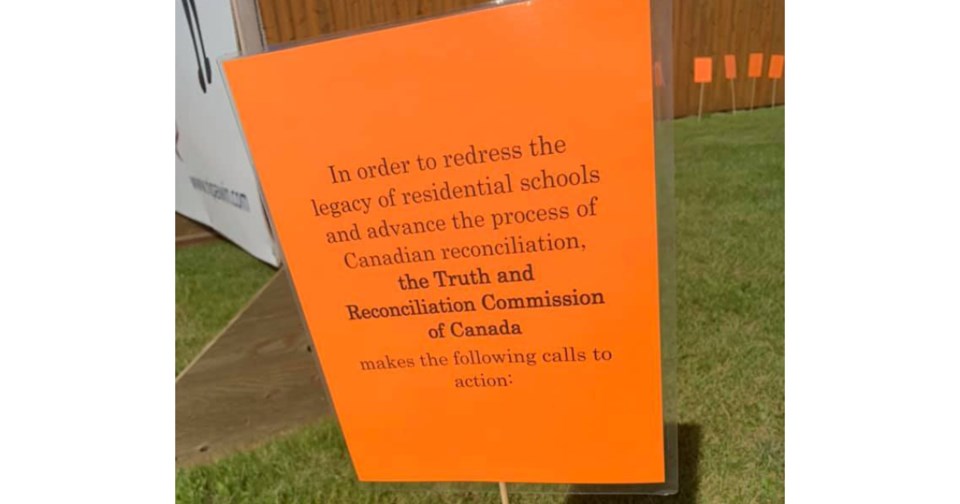NIPAWIN — Reconciliation Nipawin has placed the Truth and Reconciliation Commission (TRC) of Canada’s 94 Calls to Action at the town square, following the acknowledgement of residential school victims’ bodies across the country.
In order to redress the legacy of residential schools and advance the process of Canadian reconciliation, the Truth and Reconciliation Commission made the Calls to Action in 2015. The calls were for education, child welfare, language and culture, healthcare, missing children and burial information, and more.
Rhonda Teichreb, Reconciliation Nipawin’s co-chair, said that the decision to post them publically was a response to suggestions by Indigenous elders on how Canada Day can be used for reflection, specifically encouraging individuals to read the Calls to Action.
“There is what seems to be a shift in Nipawin to a better and more inclusive community and just encouraging everyone to take to heart, in my opinion, the most gracious and reasonable requests by Indigenous leaders,” Teichreb said.
Reconciliation Nipawin is a community organization which seeks to eliminate racism by providing education on the community’s history, and by supporting people through the Truth and Reconciliation Calls to Action.
Other projects Reconciliation Nipawin has been working on include KAIROS blanket exercises, which is an interactive educational program that teaches the history of indigenous peoples in Canada; communicating with the Office of the Treaty Commissioner on the opportunity to have additional reconciliation meetings in the community; Nipawin Indigenous history collecting; and Treaty 6 land acknowledgments.
For National Indigenous Peoples Day, the organization placed permanent land acknowledgements at the three entrances to Nipawin through grant money from SaskCulture.
In 2020, the Yellowhead Institute reported that only eight Calls to Action were completed. These were Call 13: federal acknowledgement of Indigenous language rights; Call 41: missing and murdered Indigenous women and girls inquiry; Call 48: adoption of United Nations Declaration on the Rights of Indigenous Peoples (UNDRIP) by churches and faith groups; Call 49: rejection of the Doctrine of Discovery by churches and faith groups; Call 72; federal support for the National Centre for Truth and Reconciliation; Call 83: reconciliation agenda for the Canada Council for the Arts; Call 85: reconciliation agenda for the Aboriginal Peoples’ Television Network; Call 88: long-term support from all levels of government for North American Indigenous Games.
“In 2020, a tumultuous year for many reasons, our analysis reveals that just eight Calls to Action have been implemented, this is down from nine in 2019,” read the report, prepared by Eva Jewell and Ian Mosby. “Ultimately, we find that Canada is failing residential school Survivors and their families.”
The reasons attributed for the low number of Calls to Action completed include exclusion of Indigenous peoples from the public interest by policy makers; deep rooted paternalistic attitudes of politicians, bureaucrats, and other policy makers; the ongoing legacy and reality of structural anti-Indigenous racism; predatory non-Indigenous organizations that exploit reconciliation; and insufficient resources.
Call 90: federal support for Indigenous sports programs and athletes was taken off the completed list in 2020 due to “significant stumbling blocks for Indigenous sport in Canada remain unaddressed” including the absence of a national policy for Indigenous sport.
The full 94 Calls to Action can be read on trc.ca.
“That truth has been known for a very long time… in that [TRC] report it collected the stories of many residential school survivors,” Teichreb said. “Despite that, six years later we’re now just beginning to, in a more compressive way in Canada, taking the time to listen, and learn, and understand.”




